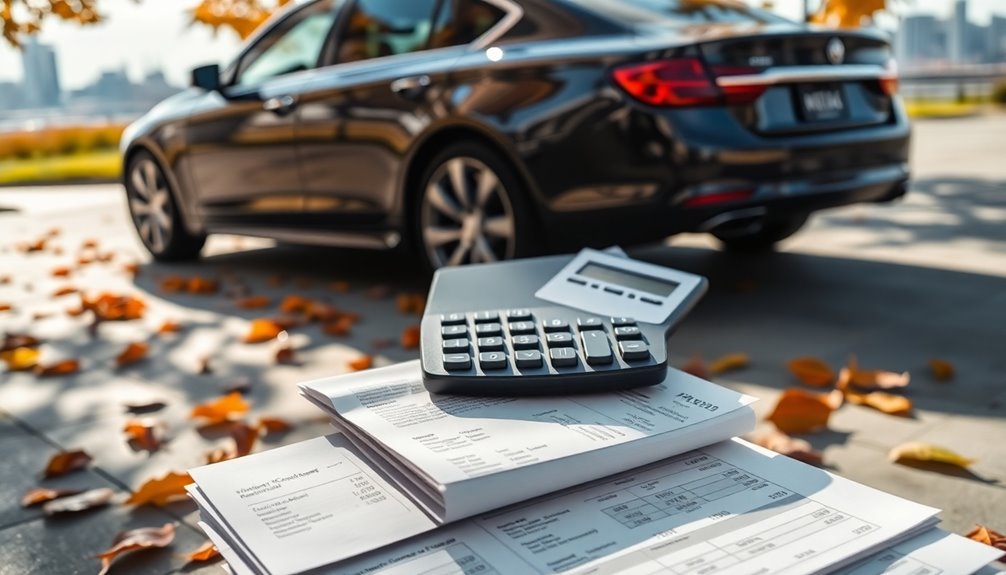When you buy a car, taxes and fees can vary widely. Sales tax ranges from 2% to over 8%, depending on your state. Documentation fees can add anywhere from $85 to nearly $500, not counting any extra charges from dealerships. Registration fees also differ, with some states charging up to $636. Title fees usually cost around $15 to $33. Don't forget additional fees for electric vehicles or local taxes. To avoid surprises, it's essential to understand these costs. If you want to explore how to potentially save on your purchase, there's more to consider ahead.
Key Takeaways
- Car sales tax rates vary significantly by state, ranging from 2% in Alabama to 8.25% in Nevada, with some states having no sales tax.
- Documentation fees can range considerably, with California capping them at $85, while other states average around $499, especially at dealerships.
- Registration fees depend on vehicle weight and age, with costs varying widely; for example, Colorado's fees range from $35.50 to $84.
- Additional charges, like title and transfer fees, can vary by state, with California charging $15 and Texas charging $33 for title transfers.
- Incentives and trade-ins can reduce overall costs, with trade-in assistance typically offering between $500 and $1,000 off the purchase price.
Understanding Sales Tax
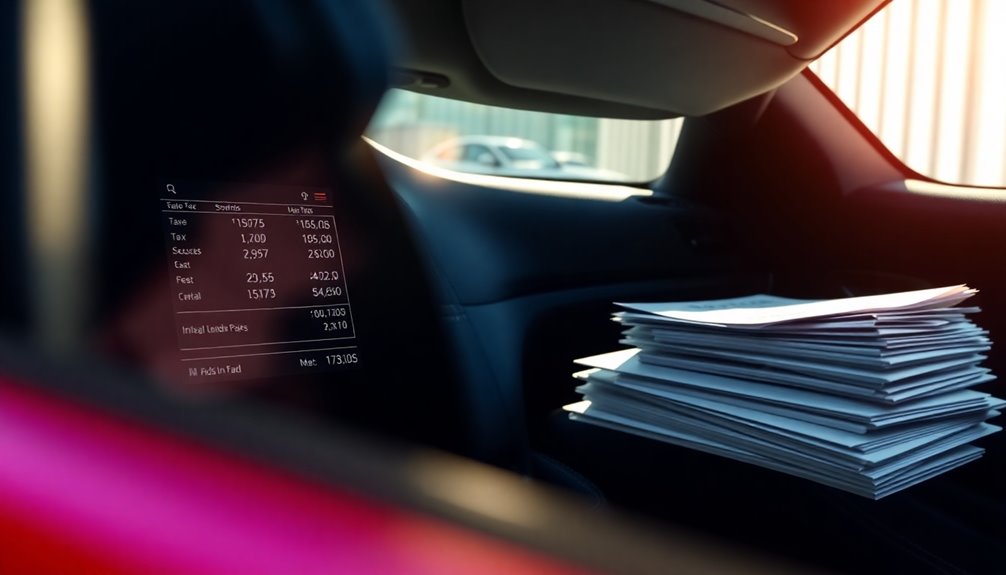
When buying a car, understanding sales tax is crucial, as it can significantly affect your total purchase price. Different states impose varying sales tax rates, which can range from as low as 2% in Alabama to a hefty 8.25% in Nevada.
When calculating sales tax, you'll want to multiply the purchase price by the sales tax rate after converting that rate to a decimal. For example, if you're in a state with a 6% sales tax, you'd convert that to 0.06 and multiply it by your purchase price. It's also important to remember that local jurisdictions can add their own taxes, so your actual rate may be higher depending on where you live. In places like New York, the combined state and local rates can differ significantly, impacting your total cost.
Additionally, some states have unique rules, like Connecticut charging a higher rate for pricier vehicles. Always check the current sales tax rate in your area to avoid surprises. States with zero car sales tax can lead to substantial savings for buyers, making them an attractive option for vehicle purchases.
Being informed about these taxes helps you budget more accurately and prevents any unexpected costs when you're ready to make your purchase.
Documentation Fees Explained
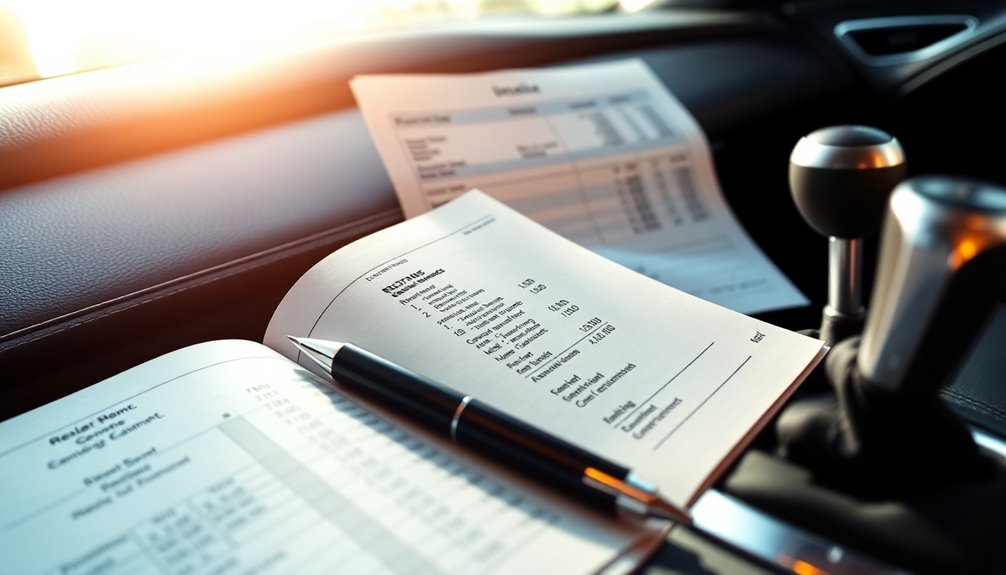
Documentation fees, often referred to as "doc fees," are an essential part of the car-buying process that you should understand. These fees cover the cost of preparing and filing your sales contract and other necessary paperwork, including vehicle registration and license plates.
The amount you'll encounter can vary widely from dealership to dealership, even within the same state. While some states, like California, cap doc fees at $85, others, such as Florida and Arizona, have no limits, leading to median fees around $499. Additionally, keep in mind that state regulations can significantly impact the doc fees charged by dealerships.
It's important to note that doc fees are legitimate and necessary, though they may feel like an add-on to your total cost. Dealers should disclose these fees early in the buying process, so you won't be caught off guard.
While most doc fees aren't negotiable, you can negotiate the car's price to offset them. If you're concerned about high fees, comparing different dealerships can help you find a better rate.
Keep in mind that when purchasing from a private party, you won't incur any doc fees, which could save you money. Being aware of these fees will help you budget effectively for your car purchase.
Registration Fees Breakdown

Understanding registration fees is crucial for budgeting your car purchase effectively. These fees vary significantly by state and are often based on your vehicle's weight, age, and type.
For instance, in Colorado, you'll pay between $35.50 and $84, while in Utah, fees start at $44 for vehicles under 12,000 pounds, increasing for heavier models. Maryland's fees range from $135 to $187 for a two-year registration.
Some states impose higher fees; for example, Oregon charges new vehicle registration fees between $268.50 and $636.50. In contrast, Florida's new registration fee is $225, with renewals costing between $14.50 and $32.50. Additionally, some states charge additional fees for electric and hybrid vehicles, impacting your overall registration costs.
If you own an electric or hybrid vehicle, expect additional annual fees. Iowa charges $65 for EVs and $32.50 for plug-in hybrids, while Michigan's fees range from $135 to $235 for EVs.
Don't forget regional and county-specific fees, like Wisconsin's county wheel tax of $10 to $30 or California's various local fees.
When buying a vehicle, be sure to account for these registration fees to avoid surprises.
Title and Transfer Fees
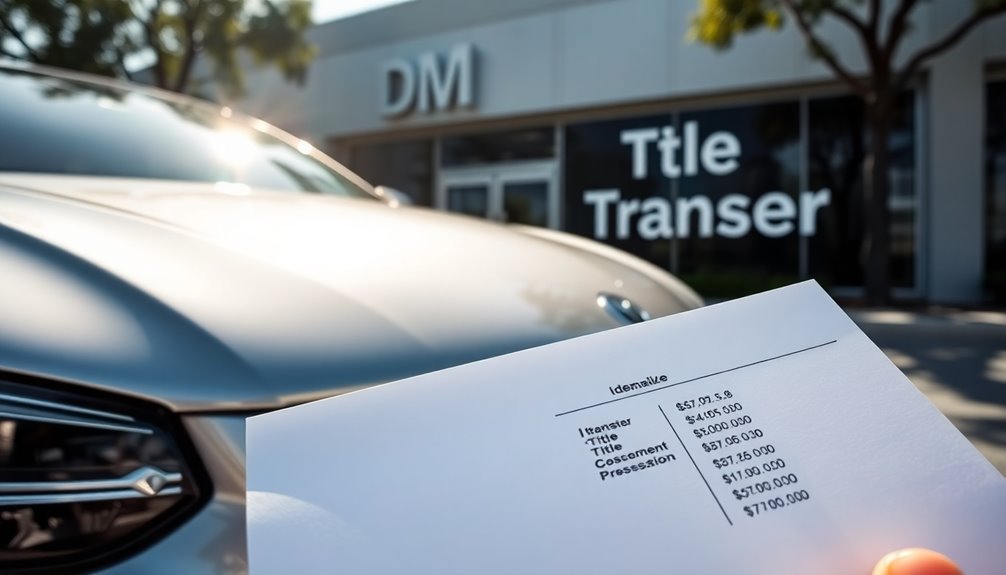
Title and transfer fees are essential costs to consider during your car purchase process, as they can significantly impact your overall budget. These fees vary by state, so it's crucial to know what to expect.
For example, if you're in California, the title transfer fee is a reasonable $15, while in Texas, it's $33. New York and Florida have higher fees, ranging from $50 to $85.25, and Illinois tops the list at $150.
In addition to the title transfer fee, you might encounter other charges. Lien release fees, expedited processing fees, and plate fees can add up, with plate fees typically ranging from $5 to $30. DMV fees are essential for ensuring legal compliance during the vehicle ownership transfer process.
If you don't complete the transfer within the designated time frame, late transfer penalties may apply, varying by state.
Understanding these costs upfront helps you budget accurately for your car purchase. Always check your specific state's regulations, as they can affect the total you'll need to pay.
Taking the time to research title and transfer fees ensures there are no surprises when it's time to finalize your vehicle ownership.
Incentives and Trade-ins
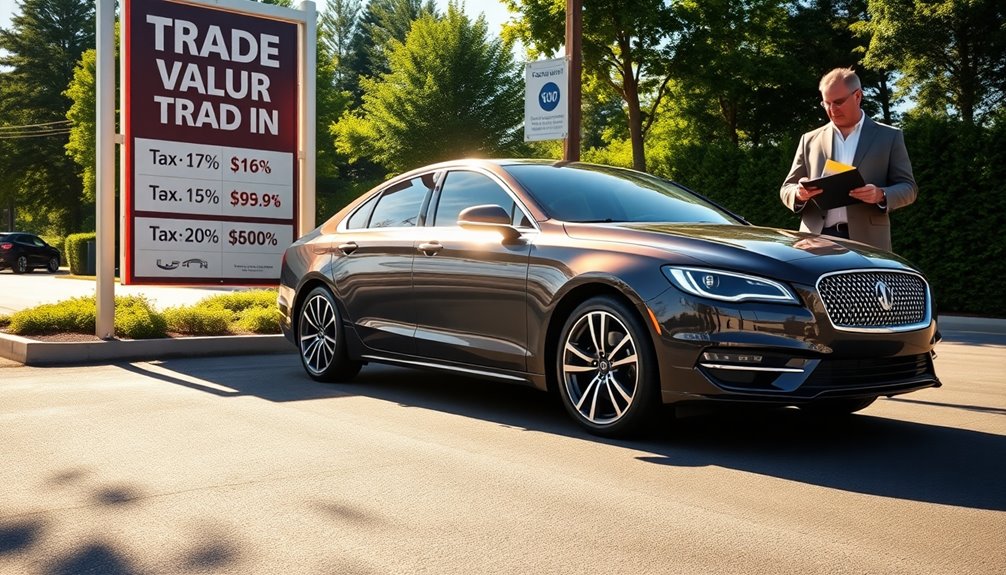
When budgeting for your car purchase, don't overlook the potential savings from incentives and trade-ins. Manufacturers often offer cash back rebates ranging from $500 to $5,000, which can significantly reduce your purchase price. If you're loyal to a brand, you might also qualify for loyalty incentives, typically starting at $500. Alternatively, if you own a competing brand's vehicle, conquest cash could provide similar benefits.
Trade-in assistance is another way to save, usually offering $500 to $1,000 when you trade in an existing vehicle. Brands like Ford, Chevy, and Chrysler typically provide this, while import brands may not. These trade-in offers can lower your overall costs whether you're buying or leasing. Additionally, many manufacturers offer trade-in assistance, which can enhance your savings even further.
It's essential to check eligibility requirements, as they often involve specific model years or ownership proof. Additionally, combining trade-in assistance with other incentives, like cash back rebates, can maximize your savings.
Aim to time your purchase around holidays or end-of-model-year sales to access the best deals. By effectively utilizing these incentives and trade-ins, you can make a more budget-friendly car purchase.
Additional Fees Overview
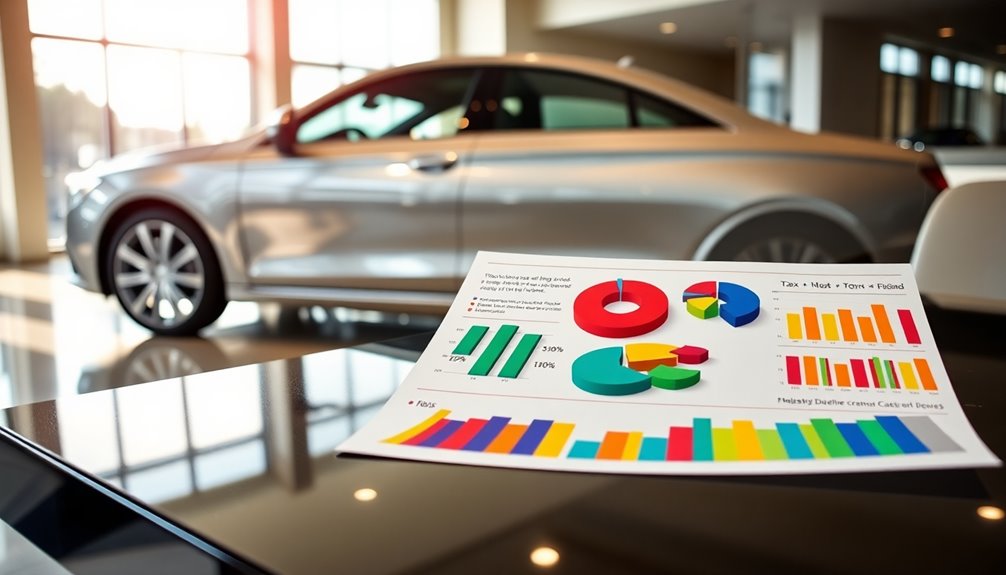
Buying a car involves more than just the sticker price; you'll also encounter a variety of additional fees that can impact your budget.
First up is the documentation fee, which covers the preparation and filing of paperwork like the sales contract and registration. This fee varies by state, with some setting a flat cost usually under $100, while others allow dealers to charge more. It's often non-negotiable and can add up to 8% or 10% of the car's price. Dealer fees can significantly increase the overall cost of your vehicle purchase.
Next, you'll face transportation and delivery fees, commonly known as destination charges. These can reach upwards of $1,700 and are applied regardless of how far the car is shipped.
Inspection and emission fees are another consideration; these mandatory charges cover safety and emissions inspections and vary by state, but they typically remain affordable.
Finally, don't forget about annual registration fees, which differ significantly by state. For instance, Oregon's fees can soar up to $636.50, while Arizona might only charge a base of $8.
State-Specific Tax Variations
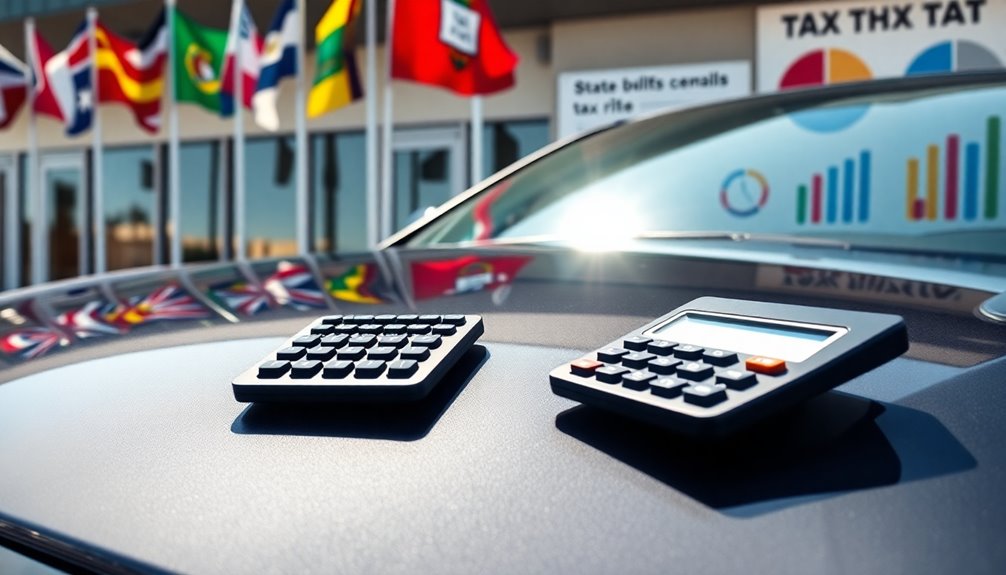
Understanding the various fees associated with purchasing a car sets the stage for grasping state-specific tax variations that can significantly affect your overall cost. Each state has its own car sales tax, and these rates can vary widely.
For instance, Nevada has the highest rate at 8.25%, while states like Kansas and California come in at 7.5% and 7.25%, respectively. On the flip side, some states like Alaska, Delaware, Montana, New Hampshire, and Oregon have no car sales tax at all.
Connecticut stands out with a standard rate of 6.35%, but if you're buying a vehicle over $50,000 or weighing over 12,500 pounds, expect that rate to jump to 7.75%. Additionally, it's important to note that sales tax applies to both new and used car purchases in most states, regardless of whether purchased from a dealership or private seller.
North Carolina takes a different route with a highway-use tax of 3% instead of a sales tax. Other states may also have county-specific fees, like Georgia, or varying rates depending on the county, as seen in Nevada and Hawaii.
Knowing these state-specific tax variations can help you budget better when you're ready to buy your next vehicle.
Calculating Total Costs

Calculating total costs for purchasing a car involves more than just the sticker price; you'll need to consider various fees and taxes that can significantly add to your expenses.
Start with the initial registration fees, which include the base registration fee (usually around $46 for new registrations in California), the California Highway Patrol fee (about $23-$32), and the Vehicle License Fee (0.65% of the vehicle's value). Additionally, high registration fees rank California among the highest in the U.S., reflecting the state's budgetary needs and infrastructure funding.
Don't forget the transportation improvement fee, which ranges from $27 to $192, plus any county or district fees.
For renewals, expect to pay a lower registration renewal fee, alongside the same CHP and VLF fees. If you're in California, you may need to pay a smog abatement fee of $25 as well.
Some one-time fees, like the infrastructure maintenance fee and title fees, are added initially, while special vehicle fees, such as those for hybrids or electric cars, can increase annually.
Keep in mind that state-specific calculations can make a big difference, so it's crucial to research your state's fee structure to get an accurate total cost for your car purchase.
Impact of Vehicle Type

When it comes to vehicle type, the impact on your registration fees can be significant. Your vehicle's declared value or purchase price often determines your registration fees. For example, if you own a $1,500 vehicle, you might face a 1% registration tax, translating to a $15 fee that could be deductible as personal property tax on your federal income tax return.
The weight of your vehicle also plays a role, particularly in states that base registration fees on this factor. If your vehicle weighs 3,400 pounds, you could incur an additional $17 fee that isn't deductible. Additionally, some registration fees may qualify as deductible if they meet the IRS criteria for personal property taxes.
Moreover, the model year and type of your vehicle can influence registration costs. Newer cars generally attract higher fees due to their increased value. Some states have specific fees for different vehicle types, such as commercial versus passenger vehicles.
Lastly, location matters; registration fees can differ widely between states, counties, and cities. For instance, California uses a detailed calculation involving your vehicle's declared value and your county of residence, while Texas has a base fee structure.
Understanding these factors helps you anticipate your registration expenses accurately.
Tips for Reducing Fees

Reducing taxes and fees on a car can save you a significant amount of money, and there are several strategies to consider.
First, focus on negotiating the "out-the-door price," which includes all fees and taxes, instead of just the MSRP. When shopping for a vehicle, aim to visit dealerships at the end of the month when salespeople are eager to meet their quotas.
Getting pre-approved financing can strengthen your bargaining position and help you avoid dealer financing traps. Additionally, shop around for car loans to find the best interest rates and terms. Understanding the total cost of ownership, including insurance premiums, is essential for financial planning.
When it comes to ongoing expenses, consider bundling your insurance or increasing your deductible to lower premiums. You can also maximize fuel efficiency by grouping trips and driving safely.
If you use your vehicle for business, keep meticulous records of mileage and expenses to claim tax deductions on repairs and maintenance.
Finally, always be on the lookout for manufacturer incentives like cash-back rebates that can further reduce your overall costs.
Frequently Asked Questions
How Do Taxes Differ for Electric Versus Gas Vehicles?
When you own an electric vehicle (EV), your taxes can differ significantly from those of gas-powered cars.
You might benefit from federal and state incentives that can reduce your overall costs. However, some states impose higher registration fees for EVs to compensate for lost gas tax revenue.
Additionally, you could face alternative taxation methods in the future, like paying based on miles driven, which doesn't affect gas vehicle owners in the same way.
Can I Negotiate the Sales Tax Rate With the Dealership?
You can't negotiate the sales tax rate with the dealership.
Sales tax rates are set by law and vary by state, so they're fixed and non-negotiable.
If there's an error in tax calculations, the dealer should adjust the vehicle's price instead.
Always make sure your sales contract clearly states the total "out the door" price, including taxes and fees, so you know exactly what you're paying before finalizing the deal.
Are There Tax Exemptions for Military Personnel When Buying a Car?
Yes, there are tax exemptions for military personnel when buying a car.
Depending on your state, you might qualify for exemptions like sales tax deferment or even complete waivers.
For instance, if you're stationed in Georgia, you can request an exemption from Title Ad Valorem Tax.
Make sure to gather necessary documentation, such as military orders and purchase contracts, to support your claims and maximize your benefits.
What Happens if I Move to a Different State After Purchase?
If you move to a different state after buying a car, you'll need to register it in your new state.
You might get a credit for the sales tax you already paid, but check the limits.
Registration fees vary based on your vehicle's specifics.
Don't forget to update your insurance policy to meet the new state's requirements.
Also, be aware of any additional fees that may apply when registering your car.
How Are Taxes Applied to Leased Vehicles Compared to Purchased Ones?
When you lease a vehicle, sales tax applies only to your monthly payments, not the total vehicle price.
In contrast, purchasing a vehicle means you pay sales tax on the full purchase amount upfront. This can lead to higher initial costs when buying.
Your state's tax rates will impact how much you owe, so it's essential to check local regulations to understand the total tax implications of your choice.
Conclusion
When you're buying a car, it's essential to factor in all the taxes and fees to avoid surprises. From sales tax to documentation and registration fees, knowing what to expect can help you budget effectively. Don't forget to consider state-specific variations and potential incentives. By understanding these costs and exploring ways to reduce them, you'll be better prepared to make a smart financial decision on your next vehicle purchase. Happy car shopping!
